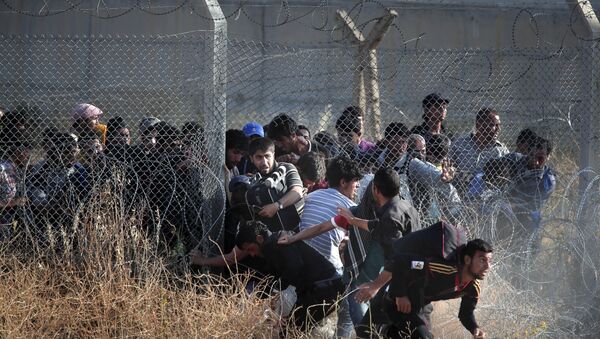In a letter addressed to European Commission Vice-President Frans Timmermans, foreign affairs chief Federica Mogherini and others, 55 cross-party MEPs say the conditions facing returned migrants and refugees in Turkey are not acceptable.
"Thousands of Syrian refugees in Turkey are living in extreme poverty, outside camps without any kind of socioeconomic support," said Italian lawmaker Barbara Spinelli from the European Left/Nordic Green Left (GUE/NGL) bloc in the European Parliament.
"Only 15 per cent of Syrian children in Turkey go to school and additional children are not accepted due to lack of resources."
55 MEPs denounce #Turkey’s failure to protect and grant decent standard of living to refugeeshttps://t.co/1w7b9t8Km5
— GUE/NGL in the EP (@GUENGL) November 15, 2016
The lawmakers also raised concerns about child labor, following reports young Syrian children were working in Turkish textile factories for as little as 5 Turkish liras (US$1.50) a day.
"Thousands of Syrian children aged between 8 and 13 years have been found to be working in textiles factories in Gaziantep and many other Turkish towns," Spinelli said.
#PT Many of my Syrian friends tell me how Syrian refugees are treated in Turkey in illegal jobs. Horror and abuse does not even describe it.
— Jonathan Moremi (@jonamorem) October 24, 2016
"They work in painful conditions, in close contact with a wide range of toxic chemicals and other hazardous substances such as hydrochloric acid. Their bodies show marks of exploitation and severe physical ill-treatment.
"The Turkish government cannot protect the rights and the interests of refugees and, more specifically, of refugee children. We call for an end to the return of refugees to Turkey because it clearly cannot be considered a safe country for them," she added.
Concerns Over 'Safe Third Country' Definition
The criticism has once again raised ethical questions over the EU-Turkey migration deal and the definition of what constitutes a "safe third country."
And while the EU declared Turkey as a "safe third country" before signing the migration deal in March, there have been serious questions over the actual conditions facing refugees and migrants in the country and whether Turkey should be considered as a "safe" country.
Good question on EU-Turkey deal: Is Turkey really a safe third country? Has limited 1951 #refugees conv to Europeans https://t.co/FB7XpejUfd
— Martin Hinrichs (@hinrichsm) November 14, 2016
Given allegations of Turkish breaches of humanitarian law and other crackdowns in relation to the government's action following July's filed coup, critics have argued that the EU-Turkey migration deal is not only unethical, but is in breach of "safe third country" definitions in the Geneva Convention.
These concerns come amid increased tensions between Turkey and the EU, with fears the migration deal may be scuppered as a result of a disagreement over plans to grant Turkish citizens passport-free travel in the bloc.
Totally agree with @GuyVerhofstadt about the cancelation of VISAS for Turkey since they don't respect democratic ideas.
— Nicolás Alcántara (@nicoalku90) November 13, 2016
Under the migration deal, the EU has agreed to send every migrant and refugee who reaches EU territory without proper legal documentation back to Turkey, with the bloc then accepting a refugee from an existing camp in Turkey on a "one-for-one" basis.


